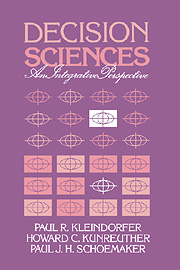Preface
Published online by Cambridge University Press: 05 June 2012
Summary
This book reflects our current and evolving thinking about the field of decision sciences. It is somewhat embarrassing to admit that it has been over 10 years since we first envisioned writing what was originally intended to be a monograph. Had we ever imagined that it would take us so long to complete, it is not clear that we would have ever started on this endeavor. Now that we have finally finished, we are glad that we were not perfectly informed about the convoluted path it would take.
One of the reasons for the hiatus between start and finish has been the burgeoning literature in the field of decision sciences. Many of the recent studies have raised more new questions than they have answered old ones. The other principal factor that has caused the long gestation was the many pleasurable discussions among the three of us, which repeatedly stimulated us to reflect anew on what the field of decision sciences is really all about.
In truth, the field of decision sciences is still in its infancy compared with the many disciplines from which it draws, such as philosophy, economics, sociology, psychology, and even management science. It was only in 1974 that the Decision Sciences Group was formed at the Wharton School. Since that time a number of universities around the country and the world have formed decision sciences centers as well. Each one has its own orientation and flavor, but the basic mission is generally the same: to understand and improve decision making.
- Type
- Chapter
- Information
- Decision SciencesAn Integrative Perspective, pp. vii - xPublisher: Cambridge University PressPrint publication year: 1993



